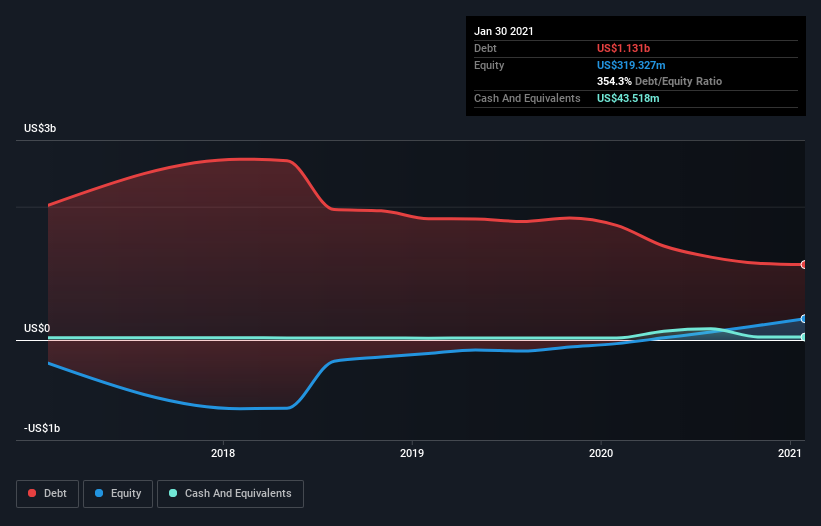- United States
- /
- Food and Staples Retail
- /
- NYSE:BJ
We Think BJ's Wholesale Club Holdings (NYSE:BJ) Can Stay On Top Of Its Debt

Some say volatility, rather than debt, is the best way to think about risk as an investor, but Warren Buffett famously said that 'Volatility is far from synonymous with risk.' So it seems the smart money knows that debt - which is usually involved in bankruptcies - is a very important factor, when you assess how risky a company is. We can see that BJ's Wholesale Club Holdings, Inc. (NYSE:BJ) does use debt in its business. But the more important question is: how much risk is that debt creating?
When Is Debt Dangerous?
Generally speaking, debt only becomes a real problem when a company can't easily pay it off, either by raising capital or with its own cash flow. In the worst case scenario, a company can go bankrupt if it cannot pay its creditors. While that is not too common, we often do see indebted companies permanently diluting shareholders because lenders force them to raise capital at a distressed price. Of course, the upside of debt is that it often represents cheap capital, especially when it replaces dilution in a company with the ability to reinvest at high rates of return. When we examine debt levels, we first consider both cash and debt levels, together.
View our latest analysis for BJ's Wholesale Club Holdings
How Much Debt Does BJ's Wholesale Club Holdings Carry?
As you can see below, BJ's Wholesale Club Holdings had US$1.13b of debt at January 2021, down from US$1.72b a year prior. However, it also had US$43.5m in cash, and so its net debt is US$1.09b.

How Strong Is BJ's Wholesale Club Holdings' Balance Sheet?
According to the last reported balance sheet, BJ's Wholesale Club Holdings had liabilities of US$2.03b due within 12 months, and liabilities of US$3.06b due beyond 12 months. Offsetting this, it had US$43.5m in cash and US$172.7m in receivables that were due within 12 months. So its liabilities total US$4.88b more than the combination of its cash and short-term receivables.
This is a mountain of leverage relative to its market capitalization of US$6.48b. This suggests shareholders would be heavily diluted if the company needed to shore up its balance sheet in a hurry.
We use two main ratios to inform us about debt levels relative to earnings. The first is net debt divided by earnings before interest, tax, depreciation, and amortization (EBITDA), while the second is how many times its earnings before interest and tax (EBIT) covers its interest expense (or its interest cover, for short). This way, we consider both the absolute quantum of the debt, as well as the interest rates paid on it.
With net debt sitting at just 1.3 times EBITDA, BJ's Wholesale Club Holdings is arguably pretty conservatively geared. And it boasts interest cover of 8.0 times, which is more than adequate. On top of that, BJ's Wholesale Club Holdings grew its EBIT by 74% over the last twelve months, and that growth will make it easier to handle its debt. There's no doubt that we learn most about debt from the balance sheet. But ultimately the future profitability of the business will decide if BJ's Wholesale Club Holdings can strengthen its balance sheet over time. So if you're focused on the future you can check out this free report showing analyst profit forecasts.
Finally, a company can only pay off debt with cold hard cash, not accounting profits. So we always check how much of that EBIT is translated into free cash flow. Over the last three years, BJ's Wholesale Club Holdings recorded free cash flow worth a fulsome 82% of its EBIT, which is stronger than we'd usually expect. That positions it well to pay down debt if desirable to do so.
Our View
BJ's Wholesale Club Holdings's conversion of EBIT to free cash flow suggests it can handle its debt as easily as Cristiano Ronaldo could score a goal against an under 14's goalkeeper. But truth be told we feel its level of total liabilities does undermine this impression a bit. Taking all this data into account, it seems to us that BJ's Wholesale Club Holdings takes a pretty sensible approach to debt. While that brings some risk, it can also enhance returns for shareholders. When analysing debt levels, the balance sheet is the obvious place to start. But ultimately, every company can contain risks that exist outside of the balance sheet. For example - BJ's Wholesale Club Holdings has 1 warning sign we think you should be aware of.
At the end of the day, it's often better to focus on companies that are free from net debt. You can access our special list of such companies (all with a track record of profit growth). It's free.
If you’re looking to trade BJ's Wholesale Club Holdings, open an account with the lowest-cost* platform trusted by professionals, Interactive Brokers. Their clients from over 200 countries and territories trade stocks, options, futures, forex, bonds and funds worldwide from a single integrated account. Promoted
Valuation is complex, but we're here to simplify it.
Discover if BJ's Wholesale Club Holdings might be undervalued or overvalued with our detailed analysis, featuring fair value estimates, potential risks, dividends, insider trades, and its financial condition.
Access Free AnalysisThis article by Simply Wall St is general in nature. It does not constitute a recommendation to buy or sell any stock, and does not take account of your objectives, or your financial situation. We aim to bring you long-term focused analysis driven by fundamental data. Note that our analysis may not factor in the latest price-sensitive company announcements or qualitative material. Simply Wall St has no position in any stocks mentioned.
*Interactive Brokers Rated Lowest Cost Broker by StockBrokers.com Annual Online Review 2020
Have feedback on this article? Concerned about the content? Get in touch with us directly. Alternatively, email editorial-team (at) simplywallst.com.
About NYSE:BJ
BJ's Wholesale Club Holdings
Operates warehouse clubs on the eastern half of the United States.
Proven track record with adequate balance sheet.
Similar Companies
Market Insights
Community Narratives




